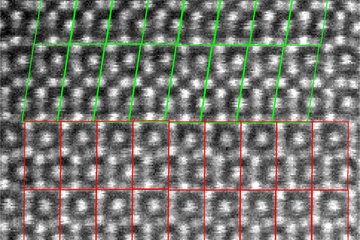All genres
1.
Journal Article
Carbon-Sulfur Bond Cleavage During Adsorption of Octadecane Thiol to Copper in Ethanol. Langmuir 35 (21), pp. 6888 - 6897 (2019)
2.
Journal Article
Influence of Al content and pre-oxidation on the aqueous corrosion resistance of binary Fe–Al alloys in sulphuric acid. Corrosion Science 149, pp. 123 - 132 (2019)
3.
Journal Article
Cathodic delamination kinetics of thin polystyrene model coatings bound to zinc via organosilanes. Materials and Corrosion - Werkstoffe und Korrosion 70 (3), pp. 481 - 491 (2019)
4.
Journal Article
Oxide – organic heterostructures: a case study of charge displacement absence at a SnO2 – copper phthalocyanine buried interface. Physical Chemistry Chemical Physics 20 (23), pp. 16092 - 16101 (2018)
5.
Journal Article
Delamination Kinetics of Thin Film Poly(acrylate) Model Coatings Prepared by Surface Initiated Atom Transfer Radical Polymerization on Iron. Journal of the Electrochemical Society 165 (16), pp. C991 - C998 (2018)
6.
Journal Article
LOW temperature growth of gallium oxide thin films via plasma enhanced atomic layer deposition. Dalton Transactions 46, pp. 16551 - 16561 (2017)
7.
Journal Article
Systematic molecular engineering of Zn-ketoiminates for application as precursors in atomic layer depositions of zinc oxide. Dalton Transactions 45, pp. 19012 - 19023 (2016)
8.
Journal Article
Fischer indole synthesis of 3-benzyl-1H-indole via conductive and dielectric heating. Chemistry of Heterocyclic Compounds 52 (11) (2016)
9.
Journal Article
Surface Functionalization of Oxide-Covered Zinc and Iron with Phosphonated Phenylethynyl Phenothiazine. Langmuir 31 (26), pp. 7306 - 7316 (2015)
10.
Journal Article
Synthesis of ultrathin poly(methyl methacrylate) model coatings bound via organosilanes to zinc and investigation of their delamination kinetics. ACS Applied Materials & Interfaces 6 (20), pp. 18112 - 18121 (2014)
11.
Talk
Electron transfer of gold modified by self-assembled monolayers in aqueous electrolytes. EMRS fall meeting - european materials research society, Warsaw, Poland (2017)
12.
Poster
Designing Electro Responsive Self-Assembled Monolayers Based on the Coiled-Coil Peptide Binding Motif. 17th International Conference on Organized Molecular Films” (ICOMF17), New York, NY, USA (2018)
13.
Poster
Electron transfer characteristics of gold and oxide-covered copper in aqueous electrolytes modified by self-assembled monolayers. ElecNano8, the 8th international conference on Electrochemistry in Nanosciences
, Nancy, France (2018)
14.
Poster
Corrosion processes of gold modified with phenothiazine based SAMs in aqueous electrolytes. ICOMF16-LB16 - 16th International Conference on Organized Molecular Films, Helsinki, Finland (2016)
15.
Poster
Corrosion processes of gold in aqueous electrolytes. Single Entity Electrochemistry: Faraday Discussion, York, U.K. (2016)
16.
Poster
Surface Functionalization of Oxide-Covered Zinc and Iron with Phosphonated Phenylethynyl Phenothiazine. ecoss2015 - European Conference on Surface Science, Barcelona, Spain (2015)
17.
Thesis - PhD
Modification of metal surface electronic properties by phenothiazine-based SAMs. Dissertation, Ruhr-Universität Bochum, Bochum, Germany (2018)
18.
Thesis - Master
Oberflächenmodifizierung von Zink (Eisen) mit Ethinylphenothiazinen und Charakterisierung. Master, Institut für Organische und Makromolekulare Chemie, Heinrich-Heine-Universität Düsseldorf, Düsseldorf, Germany (2014)











